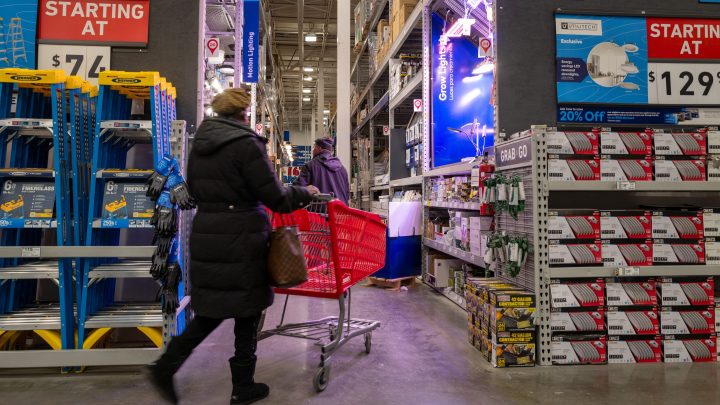
What do falling inflation and rising incomes mean for consumer spending?
What do falling inflation and rising incomes mean for consumer spending?

The big economic news of the day? The personal consumption expenditures price index for January from the Bureau of Economic Analysis. It found prices were up 2.4% from the same time in 2023. When you strip out the volatile food and energy categories, the increase was 2.8%.
Those year-over-year inflation figures have been falling over the last few months, but they’re still higher than the Federal Reserve would like to see.
The same report found that people’s incomes have been rising too — up 1% in January. That’s the biggest monthly gain since 2021.
Last month was a little unusual when it comes to incomes. For one thing, Social Security benefits went up.
“January is when you see the adjustment to cost-of-living indices from the prior year start to hit Social Security checks,” said George Pearkes, macro strategist at Bespoke Investment Group.
Pearkes said another factor pushing up January incomes was the almost $80 billion in dividend payments from stocks.
And when you exclude those one-off factors and look at actual wage growth? “That didn’t really move around that much. That basically did what was expected in January,” he said.
But even though wage growth didn’t move around that much, it was pretty resilient.
Shannon Grein, an economist at Wells Fargo, said we can thank the strong job market for that.
“So even though the labor market is showing some signs of moderation, we continue to see firms hire at a decent clip. And firms cite that they are having trouble filling open positions,” she said.
As long as the job market remains tight, Grein said, wages are probably going to keep rising. Just like they have over the last several months.
“The trend there has been pretty remarkable, and I think still suggests that you’re going to see a steady pace of consumption this year,” she said.
Consumer spending has been decelerating over the last year as inflation has come down, said Michelle Meyer, chief economist of the Mastercard Economics Institute.
And this year, the trend is likely to continue.
“There’s still more work to be done for many categories in terms of seeing cooling inflationary pressure,” Meyer said, “and that will filter into some moderation in spending as well.”
That said, moderation in consumer spending isn’t the same thing as weak consumer spending.
In fact, Meyer said she expects the economy to still expand this year. It’ll just feel a little more normal.
“A newer normal than we had prior to the pandemic. But certainly not the environment that we were in in ‘21 or ‘22 or even early ‘23, when we had rising and high inflation,” she said.
And a more normal economy, Meyer said, is a pretty healthy outcome.
There’s a lot happening in the world. Through it all, Marketplace is here for you.
You rely on Marketplace to break down the world’s events and tell you how it affects you in a fact-based, approachable way. We rely on your financial support to keep making that possible.
Your donation today powers the independent journalism that you rely on. For just $5/month, you can help sustain Marketplace so we can keep reporting on the things that matter to you.

















